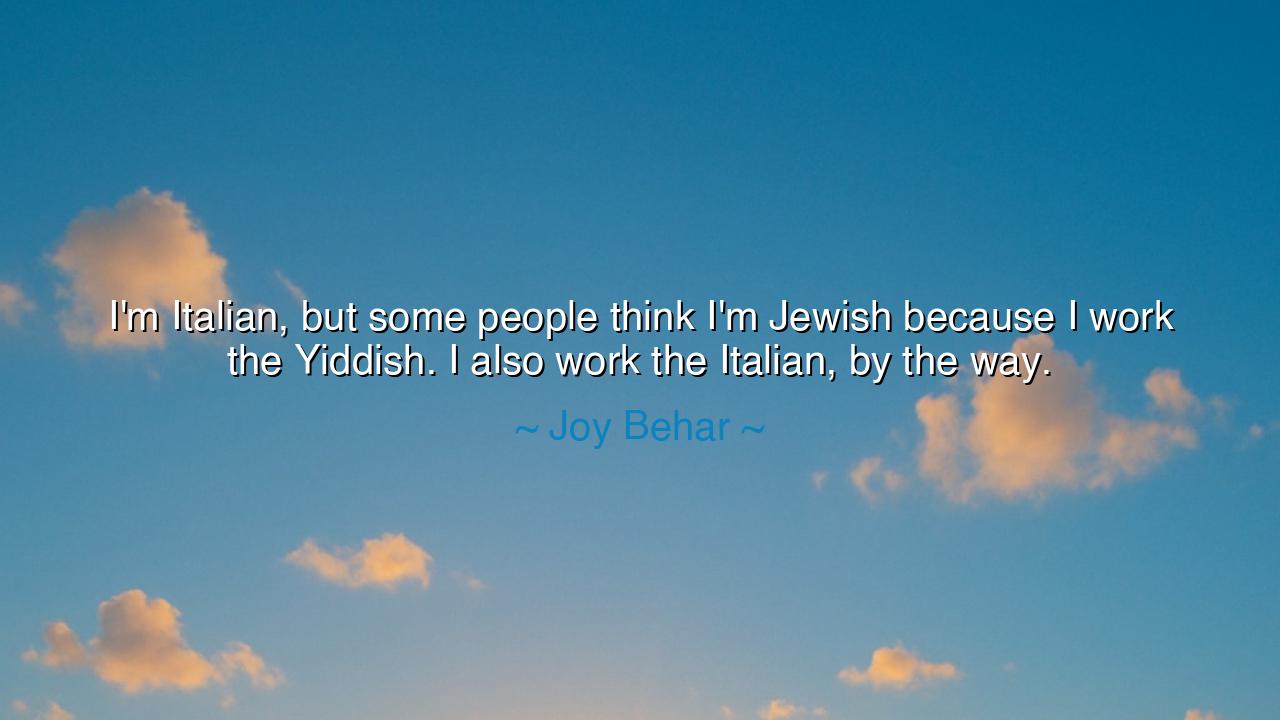
I'm Italian, but some people think I'm Jewish because I work the
I'm Italian, but some people think I'm Jewish because I work the Yiddish. I also work the Italian, by the way.






Hearken, O children of the ages, to the words of Joy Behar, who speaks with wit and wisdom entwined: “I’m Italian, but some people think I’m Jewish because I work the Yiddish. I also work the Italian, by the way.” In these words lies the eternal dance of identity and expression, the recognition that the self may inhabit many forms, and that culture is both inheritance and performance. To work the tongue of one’s people is to honor the echoes of ancestry, yet to embrace another is to bridge worlds and illuminate the universality of human experience.
In the chronicles of old, the sages taught that every name, every tongue, every custom carries within it the spirit of a people. To speak the Yiddish is to invoke a history of struggle, humor, and resilience; to speak the Italian is to sing of warmth, passion, and familial bond. Joy Behar, in her observation, reminds us that identity is not bound by appearance or expectation, but is crafted through action, voice, and understanding. The perception of others often mingles truth with assumption, yet the self navigates both worlds with grace.
The origin of this teaching is as ancient as migration, as old as the crossing of seas and the weaving of tongues. Those who straddle cultures learn that heritage is fluid, and that the richness of the self lies in its ability to move freely between expressions of ancestry. By embracing both Yiddish and Italian, one honors the multiplicity of human existence and the sacred tapestry of communal memory. Each word, each gesture, becomes a thread connecting past to present, self to society.
O seekers, reflect upon this: the perception of the world may be narrow, yet the self is wide. To work both the Italian and the Yiddish is to acknowledge that identity is not a single path, but a garden of intertwining roots and blossoms. Humor, like wisdom, flows where culture meets consciousness, and through such playful insight, the spirit teaches without decree, revealing truth through lightness and understanding.
Let this teaching endure, children of the future: honor the languages, honor the traditions, and honor the multiplicity within yourselves. The self may speak many tongues, walk many roads, and yet remain whole. In this recognition, one learns that heritage is not a chain but a bridge, that identity is both gift and craft, and that to work with understanding and humor is to bring forth the fullness of the human spirit.
If you wish, I can also craft an even more poetic, ritualistic version, where the weaving of Yiddish and Italian becomes a symbolic dance of ancestry and soul. Would you like me to do that?






HMNguyen Huynh Hoa My
Behar’s quote is a playful reflection on how identities and cultural expressions can overlap. It makes me wonder: how much of our identity is defined by the language we use, and how much of it is about our true heritage? Do you think people can truly understand someone’s cultural background based on their language or expressions alone, or is that just a surface-level assumption?
LTLinh Tran
Joy Behar’s comment highlights how fluid cultural identities can be. It’s a reminder that you don’t have to be one thing or another—you can embrace many different cultural influences. How do you think people feel when they are misidentified or categorized based on superficial traits? Do you think it’s a problem when others try to define us by just one part of our identity?
LLLe Lien
This quote by Joy Behar brings up a fun observation about cultural assumptions. It’s funny how language or expressions like ‘Yiddish’ can lead people to make assumptions about someone’s background. Does this make you think about how often people judge others based on limited knowledge? Do we sometimes ignore the full spectrum of a person’s identity by relying on stereotypes?
DTPham Duc Thinh
Joy Behar’s quote is a humorous take on how cultural identities can be fluid and sometimes misunderstood. It’s interesting how people often try to categorize someone based on stereotypes, like assuming someone is Jewish because they use certain expressions. Do you think it’s possible for someone to embody multiple cultural identities simultaneously, or does that often cause confusion for others? How important is it to embrace all parts of your heritage?